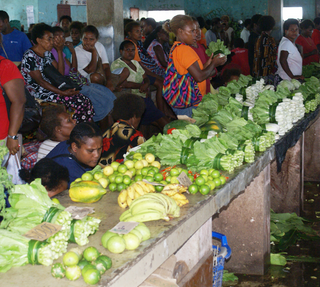Wednesday, 16 July 2014 10:35
Ready access to land, labour and credit are the basic resources necessary for farming. And choosing the right type of farming is dependent on how land can be accessed, what labour is available (family or hire), and what assets the farmer has to obtain credit. Government services through research and extension departments of ministries of agriculture, and the development of long-term agriculture sector strategies are conditions necessary for private-sector led agricultural growth.
In the Pacific up to 80% of Pacific Island populations depend directly or indirectly on the agricultural sector as their major source of livelihood, and for food and social security. However, agricultural productivity across the region has stagnated or declined over the past 40 years. A major threat faced by Pacific Islands is their growing dependence on imported food, as a result of the limited capacity of their smallholder agricultural sector to supply and satisfy the needs of the domestic market. The challenge to policy-makers and the agricultural sector stakeholders, therefore, is to obtain greater food security for the region by encouraging the large proportion of semi-commercial farmers to move into commercial production through sustained access to competitive markets. Improvement of domestic market infrastructure, local value-added processing, and development of regional markets for a diversity of Pacific crops would build on and support the desirable aspects of traditional farming systems.
A new European Union-funded project is poised to address these issues. Implemented by the Secretariat of the Pacific Community through its Land Resources Division, the Pacific Agriculture Policy Project (PAPP) will address the development needs of the commercial and smallholder agricultural sectors in the Pacific region by providing a clear, evidence-based framework for sector development, assisting the sectors to link to markets through farmer associations and facilitating the adoption of production technologies.
Availability of agricultural statistics is a major constraint to development of sector strategies to facilitate private-sector led agricultural growth. Therefore, the PAPP project will assist target countries with the production of agricultural statistics, and improve their analytical capacity.
To improve productivity of small-holder farmers and rural communities, the PAPP project will facilitate adoption of new technologies and strengthen existing traditional knowledge based on development of knowledge management and communication strategies.
The project agreement was signed in March 2013 and the project became operational in June 2014 with a full complement of staff and resources. The project will continue for 48 months and will operate in the 15 Pacific members of the African, Caribbean and Pacific Group of States (ACP), including Timor Leste. CTA, the Technical Centre for Rural and Agricultural Development, will coordinate inter-regional exchanges with the Caribbean. The Food and Agriculture Organization of the United Nations (FAO) is a collaborating partner.
PAPP Team Leader Vili Canigo said, ‘The Pacific Agriculture Policy Project underscores the importance of agricultural livelihoods in our region and the fact that the farming community are very much in the driving seat for securing growth in this important sector. Our collective challenge across the region is to ensure that farmers are well supported and that the agriculture/forestry sector is strongly positioned to contribute to national development outcomes such as health and education. Stronger, coherent and evidence-based policies that promote research, markets and broader outcomes such as heath will go a long way in helping countries promote farmer interests, advocate at the national policy level and better position the sector for increased domestic or international investment.’
The project aims to increase the capability of regional development organisations in the Pacific region to address the development needs of smallholder farmers by improving their linkages with markets. The project will assist farmer associations to develop closer working relationships with the private sector, by improving their extension and marketing capacity. And the project will work with existing professional development networks to ensure smallholder farmers and their representatives are included in national and regional consultations. PAPP will develop an integrated knowledge management and communications strategy to efficiently deliver services to farmer groups and with the use of ICTs to help collate data from national agricultural systems to better formulate sector policies.
Lessons learned from three other European Union-funded projects, the now completed All ACP Agriculture Commodities Programme (AAACP) and Facilitating Agricultural Commodity Trade FACT), and the current Increasing Agricultural Commodities Trade (IACT) project, will help PAPP to identify suitable small and medium enterprises and farmer associations for inclusion in sector policy and strategy development.
For more information, please contact PAPP Team Leader, Vili Caniogo ( This email address is being protected from spambots. You need JavaScript enabled to view it. ), or Emil Adams ( This email address is being protected from spambots. You need JavaScript enabled to view it. )





CONNECT WITH US